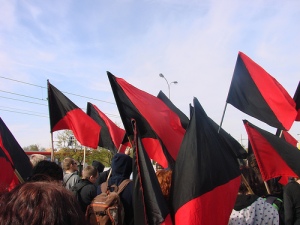Anarchism
What is Anarchism?
 At it’s simplest Anarchism is the belief that human beings are at their best when freed from the constraints of hierarchy and authority. Anarchists believe that Authority when it is encountered must be questioned to see if it is valid, oft times it is not.
At it’s simplest Anarchism is the belief that human beings are at their best when freed from the constraints of hierarchy and authority. Anarchists believe that Authority when it is encountered must be questioned to see if it is valid, oft times it is not.
The state is the most obvious form of authority as it demands our constant obedience and spreads its influence into our everyday lives. From telling us in what manner it is acceptable to live our lives to how and what our kids learn in their education the state is all pervasive.
The authority of the state is enforced through various means from the subtle – the threat of homelessness and hunger if we do not work or pay rent and taxes, to the non too subtle use of the police to attack picket lines and harass and arrest those who it deems a threat.
Anarchists are not against all forms of authority, sometimes it is necessary and valid, the surgeons authority in the operating room for example.
However the majority of manifestations of authority are invalid. Why should an individual wield authority over another merely because their family are descended from violent thugs in the middle ages as is the case of the royal family, or because their family could afford to send them to a private school or because someone put a tick in a box every four years that deferred power to someone unfit to wield that power who has neither the right nor wisdom to do so.
What do Anarchists want?
Anarchists want many, many things. We want, after all, to completely reinvent the world. We want workplaces to be controlled by those that work in them and communities to be controlled by those who live in them. We wish to see an end to all borders and for the free movement of people across the world. We want an end to the class system and for communities and workplaces to cooperate in a federative system. We want an end to racism, sexism, homophobia, nationalism and all other forms of discrimination.
What would an Anarchist world look like?
It’s difficult to truly imagine how an Anarchist world would look. I personally believe that it would be a healthier and happier world that was free from war and environmental destruction.
If workplaces were run for the benefit of the workers and local community then we would see far less polluting industry.
There would be less work to be done if the only things that were produced were things that were needed, for survival and for fun.
There would still be the unpleasant jobs that needed doing, such as collecting the rubbish, but these could be rotated so that everyone did there share of the crappy work and so no-one would have to do much of it.
I believe that science would progress at a faster rate as research is diverted away from having to prove a profitable use it would be able to seek knowledge for the sake of itself. As it should do already.
I believe that there would be no war. Wars are traditionally fought so that one group of the ruling class can acquire resources from another group of the ruling class. In a world built from the foundations of solidarity and mutual aid resources would belong to all and be used for the benefit of all. No competition for resources means no war.
I believe that an Anarchist world would become an atheist one as education is freely available to all and rationality would replace superstition and dogma. No religion would mean yet another reason for bloodshed and conflict would disappear.
So all in all an Anarchist world would be healthy, happy, green and peaceful.
This is only my opinion on what an Anarchist world would look like, there are as many different ideas as there are people. Six billion possible worlds yet we are stuck with one that causes untold suffering and starvation for the majority of the worlds population, destroys the environment, pits us against one another in a struggle for survival and allows the wealthiest, parasitical part of the population to reap the benefits of others labour.
We must be mad.

— What would an Anarchist world look like?
There’s no such thing as “an anarchist world” — only the idea of anarchy.
“Anarchism is a political theory which aims to create anarchy” — An anarchist world is one that is still attempting to bring about anarchy, which only defines the past and present world.
Furthermore, anarchists aren’t just against some authority or “bad” authority, the very definition and origin of anarchy is “the absence of authority” (an = the absence of, archy = authority), its Greek.
A surgeon is granted authority, but doesn’t need it, they only need the ability to cooperate and work with others in a non-hierarchical based way. No exceptions. The “exceptions” are the boldest oppositions to anarchy. It’s entirely oxymoronic to say there are exceptions.
“Anarchism is primarily a movement against hierarchy. Why? Because hierarchy is the organisational structure that embodies authority.”
If you are going to link to an Anarchist FAQ, its always good practice to read it first…
http://www.infoshop.org/faq/secA1.html
PS — Saying that anarchy or “anarchism” only implies to human animals is an authoritative statement in itself, not to mention downright ignorant in respect to many species that happily enjoy anarchy. But as you do not oppose all authority, this is entirely understandable.
Anarchy mean without rulers not without authority. read a dictionary you muppet.
You are not an anarchist and have no understanding of the concept. you can not simply choose to redefine the term to suit whichever crsty patch you happen to have sewn onto your hoody.
You do know that rulers are authoritarian, right?
http://www.merriam-webster.com/dictionary/anarchy
2 a: absence or denial of any authority or established order
Oh and the quotes I put in were from the link on this website that you are promoting, what’s wrong with you?? Why are not supporting one of your favourite links!! I’m confused?!
http://www.infoshop.org/faq/secA1.html#seca11
Full definition:
The word “anarchy” is from the Greek, prefix an (or a), meaning “not,” “the want of,” “the absence of,” or “the lack of”, plus archos, meaning “a ruler,” “director”, “chief,” “person in charge,” or “authority.” Or, as Peter Kropotkin put it, Anarchy comes from the Greek words meaning “contrary to authority.” [Anarchism, p. 284]
archos means ruler, an means without
http://www.infoshop.org/faq/secB1.html
To quote.
First, it is necessary to indicate what kind of authority anarchism challenges. While it is customary for some opponents of anarchism to assert that anarchists oppose all kinds of authority, the reality of the situation is more complex. While anarchists have, on occasion, stated their opposition to “all authority” a closer reading quickly shows that anarchists reject only one specific form of authority, what we tend to call hierarchy (see section H.4 for more details). This can be seen when Bakunin stated that “the principle of authority” was the “eminently theological, metaphysical and political idea that the masses, always incapable of governing themselves, must submit at all times to the benevolent yoke of a wisdom and a justice, which in one way or another, is imposed from above.” [Marxism, Freedom and the State, p. 33]
Other forms of authority are more acceptable to anarchists, it depends whether the authority in question becomes a source of power over others or not. That is the key to understanding the anarchist position on authority — if it is hierarchical authority, then anarchists are against it. . The reason is simple:
“[n]o one should be entrusted with power, inasmuch as anyone invested with authority must . . . became an oppressor and exploiter of society.” [Bakunin, The Political Philosophy of Bakunin, p. 249]
This distinction between forms of authority is important. As Erich Fromm pointed out, “authority” is “a broad term with two entirely different meanings: it can be either ‘rational’ or ‘irrational’ authority. Rational authority is based on competence, and it helps the person who leans on it to grow. Irrational authority is based on power and serves to exploit the person subjected to it.” [To Have or To Be, pp. 44-45] The same point was made by Bakunin over 100 years earlier when he indicated the difference between authority and “natural influence.” For Bakunin, individual freedom “results from th[e] great number of material, intellectual, and moral influences which every individual around him [or her] and which society . . . continually exercise . . . To abolish this mutual influence would be to die.” Consequently, “when we reclaim the freedom of the masses, we hardly wish to abolish the effect of any individual’s or any group of individual’s natural influence upon the masses. What we wish is to abolish artificial, privileged, legal, and official influences.” [The Basic Bakunin, p. 140 and p. 141]
It is, in other words, the difference between taking part in a decision and listening to alternative viewpoints and experts (“natural influence”) before making your mind up and having a decision made for you by a separate group of individuals (who may or may not be elected) because that is their role in an organisation or society. In the former, the individual exercises their judgement and freedom (i.e. is based on rational authority). In the latter, they are subjected to the wills of others, to hierarchical authority (i.e. is based on irrational authority). This is because rational authority “not only permits but requires constant scrutiny and criticism . . . it is always temporary, its acceptance depending on its performance.” The source of irrational authority, on the other hand, “is always power over people . . . Power on the one side, fear on the other, are always the buttresses on which irrational authority is built.” Thus former is based upon “equality” while the latter “is by its very nature based upon inequality.” [Erich Fromm, Man for Himself, pp. 9-10]
This crucial point is expressed in the difference between having authority and being an authority. Being an authority just means that a given person is generally recognised as competent for a given task, based on his or her individual skills and knowledge. Put differently, it is socially acknowledged expertise. In contrast, having authority is a social relationship based on status and power derived from a hierarchical position, not on individual ability. Obviously this does not mean that competence is not an element for obtaining a hierarchical position; it just means that the real or alleged initial competence is transferred to the title or position of the authority and so becomes independent of individuals, i.e. institutionalised (or what Bakunin termed “official”).
Anarchism is not utopia, anarchism is the authenticity of human life in the world, humans are born as an anarchist, but capitalism is changing humans into bourgeois robots.
Anarchy is a great idea, and here in the US, like so many other great ideas, it will die due to the laziness and complacence of the people who are both too scared and too comfortable with their little gadgets to stand up against corruption and tyranny.